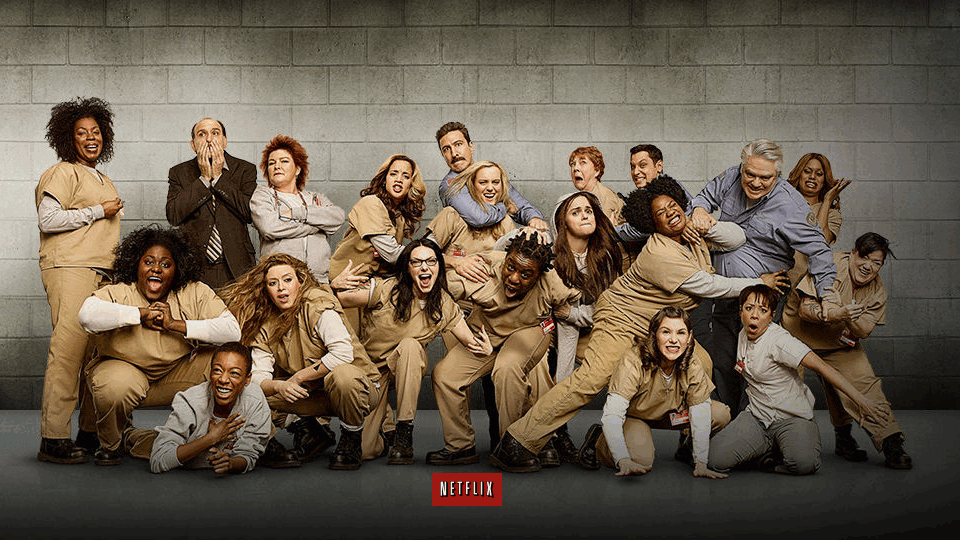((Warning: Included in this post are mild spoilers for Season Two of Orange Is The New Black. You have been warned!))
Okay, I’ll admit it: I never thought I was going to like Orange Is The New Black. I heard about it when it first went up on Netflix and thought to myself, “What do I care about the story of some entitled blond chick who goes to prison?” But I was won over by my better angels (aka all of my friends on Facebook and Twitter) and ended up marathon-watching Season One last year. And while I still had very little interest in the adventures of the ‘entitled blond chick’ (aka Piper the Eternal Narcissist), I was absolutely captivated by the rest of the show and it’s amazing characters.
More than anything, I was excited to see a show that was all about diversity in it’s cast and that tackled serious issues about women in prison with such a razor-sharp wit. I think I found my happiness with Orange is the New Black, however, in its body positivity. Because for once we have a show in which the cast isn’t what you’d call the Hollywood standard. It is body diverse and for that reason, absolutely gorgeous. The show gives the audience the stories of a plethora of types of women, from the very young to the elderly, from the absolutely beautiful to the not traditionally so. And instead of relegating those who aren’t your typical television beauty to the background, each of these women are given a place of distinction, their characters carefully crafted to be unique, interesting, heart-breaking and hilarious.
Three characters have appealed to me since the beginning of the series and represent that body positivity in spades. Kate Mulgrew, a particular favorite of mine since she played Captain Janeway on Star Trek: Voyager, plays Red, the Russian cook who rules the prison kitchen with an iron fist and fabulous red hair. Mulgrew’s storyline on the show includes Red’s constant battle with getting older, including her serious back pain issues, her vanity over her hair going grey, and comments about her figure. Though she’s certainly no spring chicken, Mulgrew brings an incredible passion and power to Red that helps fire the show through the second season.
 You don’t have to go much further than Danielle Brooks to talk about a body positive character on OITNB. Brooks plays Taystee, an inmate intent on preparing herself for a good job and a better life once she gets out of prison. Though Taystee is often on the receiving end of jokes about her weight on the show, she is proud about her body and gives back as good as she gets. One of my favorite scenes involves her telling a hilarious story about being naked and covered in food on top of a bulldozer. That kind of representation of a sex-positive larger woman on television is more of what I like to see: women joking around, not making jokes out of their weight to get a laugh. There’s plenty of serious conversation for Taystee too, like when she prepares for a job fair in Season Two and gets the receiving end of comments about being larger. The show doesn’t pull any punches about the reality of being a larger woman, and Brooks plays to that content and to the fantastic character she portrays so well.
You don’t have to go much further than Danielle Brooks to talk about a body positive character on OITNB. Brooks plays Taystee, an inmate intent on preparing herself for a good job and a better life once she gets out of prison. Though Taystee is often on the receiving end of jokes about her weight on the show, she is proud about her body and gives back as good as she gets. One of my favorite scenes involves her telling a hilarious story about being naked and covered in food on top of a bulldozer. That kind of representation of a sex-positive larger woman on television is more of what I like to see: women joking around, not making jokes out of their weight to get a laugh. There’s plenty of serious conversation for Taystee too, like when she prepares for a job fair in Season Two and gets the receiving end of comments about being larger. The show doesn’t pull any punches about the reality of being a larger woman, and Brooks plays to that content and to the fantastic character she portrays so well.
 I think for body positive stories, however, I can’t look any further than Dascha Polanco’s portrayal of Daya. While most fans go crazy for the love story of Piper and Alex on the show, I spend most of the episodes rooting for Daya and her totally forbidden love affair with Matt McGorry’s guard character John Bennett. Sure, theirs is the love that is totally a felony, but Daya is so earnest and Bennett is a super sweet character. It’s such a problematic situation and fraught with so many issues (can a woman give consent when she is in a position of no power? the law says she can’t!) but the storyline is evocative, heart-breaking, and so well done. A friend had told me about the relationship storyline before I started watching (rassum frassum spoilers) and so when I turned on the show, I honestly expected to see Daya played by some traditionally Hollywood body-typed actress. Those are the actresses which, typically, got great love story lines like these. Yet here was Dascha Polanco, a full figured woman, playing Daya and being called beautiful. And there’s no mistake, she absolutely is. Polanco plays Daya with an innocent, sweet radiance that lights up the screen, and makes her one of the prime reasons to watch Orange is the New Black.
I think for body positive stories, however, I can’t look any further than Dascha Polanco’s portrayal of Daya. While most fans go crazy for the love story of Piper and Alex on the show, I spend most of the episodes rooting for Daya and her totally forbidden love affair with Matt McGorry’s guard character John Bennett. Sure, theirs is the love that is totally a felony, but Daya is so earnest and Bennett is a super sweet character. It’s such a problematic situation and fraught with so many issues (can a woman give consent when she is in a position of no power? the law says she can’t!) but the storyline is evocative, heart-breaking, and so well done. A friend had told me about the relationship storyline before I started watching (rassum frassum spoilers) and so when I turned on the show, I honestly expected to see Daya played by some traditionally Hollywood body-typed actress. Those are the actresses which, typically, got great love story lines like these. Yet here was Dascha Polanco, a full figured woman, playing Daya and being called beautiful. And there’s no mistake, she absolutely is. Polanco plays Daya with an innocent, sweet radiance that lights up the screen, and makes her one of the prime reasons to watch Orange is the New Black.
It’s for the sake of actresses like Polanco, and Brooks, and Mulgrew that I watch the show. It is for Laverne Cox and her absolutely fantastic portrayal of Sophia, a trans woman in prison, who is breaking new ground for trans representation both on and off screen (check her out on the cover of Time magazine if you haven’t seen). Basically, I watch the show for them:
And one hundred percent not for her:

This leads me into the part about the show that I do not like, and that is the seeming inability of the show to utilize the word bisexual. For those uninitiated into the Piper Chapman drama-fest, Piper goes to prison and leaves behind her wet blanket of a fiancé Larry. In prison, she meets up once more with her ex-girlfriend Alex, with whom she used to traffic drugs and who Larry knew nothing about. No surprise, Piper ends up hooking up once more with her ex-girlfriend, played by the phenomenal Laura Prepon, and so begins the ‘will they-won’t they’ of the Piper/Larry/Alex fiasco.
A great deal of discussion goes into Piper’s sexuality on the show, which the writers seem to want to portray as complex and nuanced, as all sexuality truly is. However, in most of the show’s exploration of Piper’s sexual identity, they confine the discussion to the terms ‘straight’ or ‘lesbian’ or ‘gay’. Piper herself explains that she likes both men and women (see the above photo) but stops short of using bisexual as a term. In fact, there’s almost zero acknowledgement by many characters that bisexual is an actual choice and that one does not have to choose one way or the other.
One of the most brilliant exchanges in the show about Piper’s sexuality comes when she gets back together with Alex. Larry bemoans the situation to Cal, Piper’s weird but extremely cool and often wise brother.
Larry: So is she gay now?
Cal: I’m going to go ahead and guess that one of the issues here is your need to say that a person is exactly anything.
And with that statement, I think we get more of the showrunner’s feelings on the subject than anything else. The show battles the notion that people are able to be confined to labels, that relationships are more complicated than just one word, and that identity is not built upon a single classification. And in so many ways I applaud that idea, because the world is nuanced and not made up of check boxes on a form. Yet there is a serious issue in my eyes in the way they sweep Piper’s bisexuality under the rug. Her drunken statement above, or her often confused back and forth over whether or not she is gay, is the embodiment of the struggle that many bisexual people go through in this world. The struggle to stand up and not wince when people ask, “So you’re a lesbian?” (as her parents and friends did) or to deal with women who will say that she is a “straight girl” who is just confused (like Alex does at the end of Season One), these are constant issues that bisexual folks face. They are labeled as confused straight people or people who cannot get off the fence and ‘make a decision’ about their sexuality. They are identified as one or the other, straight and confused or a gay and in denial, all the time. These are labels bisexual folks have to deal with all the time. Piper is stuck with them on the show constantly. So if she must deal with those labels, and the writers have no problem dropping them constantly, then what’s the problem with the label of bisexual?
This mixed message of embracing the complexities of human sexuality while seeming almost ashamed of a term that accurately represents Piper’s situation seems curiously uncomfortable in a show that is so good at pushing boundaries. The often awkward conversations on the show between Piper and Larry about the Kinsey scale and being “turned gay” in prison are nothing next to the inability of the show to embrace an identity that is part of the LGBTQ spectrum, a title that is swept under the rug all the time and derided by many. If the show wants to be positive towards bisexuality, it would help if it didn’t seem to want to make the term disappear.
One must at least celebrate that Orange is the New Black is exploring this issue in the first place. For years, bisexual characters were relegated to innuendo or vague hand-waved relationship statuses on shows. I remember growing up realizing that Susan Ivanova on Babylon 5 was bisexual but being so disappointed at how behind-the-hand and indirect the show was about her attraction to the show’s resident telepath Talia Winters. I wanted to see more relationships with women explored by Jadzia Dax on Star Trek: Deep Space Nine and crowed when I started seeing more representation on the shows I loved. Now we have Delphine Cormier and her newly discovered attraction to Cosima on Orphan Black, the fantastic Captain Jack Harkness on Torchwood, Doctor Remy Hadley on House, Oberyn Martell on Game of Thrones and Bo the succubus on Lost Girl. Orange is the New Black is joining a long line of shows who are now including bisexual characters. It would however be nice to see, for all its exploration, a level of comfort with bisexuality as an identity label than what we’ve seen so far.
Maybe the idea of Orange is the New Black is to tell us to throw off labels, to ignore classifications, and to embrace the nuanced nature of each person we meet. Yet when bisexuality and the term has been much maligned, white washed, hidden and ignored in the media for years, I’d get behind the show a little more solidly if it didn’t seem so concerned with labeling Piper anything but. Because right now, for all its positive and progressive representation, I will say I’m feeling a serious lack of actual representation here.
(Though I’ll be very honest: I don’t even think if they fixed this that I’d ever like Piper. That would take a miracle.)
Postscript: Included below is a gallery of some of those characters I mentioned above that have explored bisexuality as part of their character portrayal on their shows. This is in no way a complete list of bisexual characters on television, just a few of my favorites. A lot of them, you might notice are from scifi/fantasy shows. That’s because that’s a lot of what I watch. Feel free to comment on some of your favorite representations as well, I’m always interested in hearing about others.











